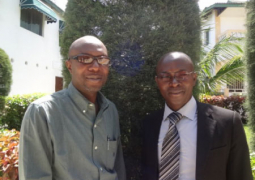The first lady Madam Zineb Yahya Jammeh last Wednesday launched the prevention of mother-to-child transmission of HIV infection at the Jammeh Foundation Hospital in Bundung.
Delivering her keynote address at the ceremony, Madam Zineb Jammeh said The Gambia has made significant strive in the fight against HIV in this country, especially the prevention of mother-to-child transmission, noting that twenty- three PMTCT facilities has been provided in the country.
She pointed out that support services should be provided to those affected with HIV and their families and counseling services expanded to other parts of the country.
While noting that men should be actively involved in PMTCT activities at all levels, Madam Jammeh also called on officials of the Ministry of Health to also launch the PMTCT in all the health regions in the country.
Deputising for the Minister of Health and Social Welfare at the occasion, the Minister of Basic and Secondary Education, Mrs. Fatou Lamin Faye stated that the prevention of mother-to-child transmission of HIV infection is one of the top most priority areas in the reduction of both infant and child morbidity and mortality. As a result, she added, the government of The Gambia through the Ministry of Health and Social Welfare, and in partnership with the stakeholders has taken significant steps in the implementation of this strategy across the country.
?The government of The Gambia is very committed to containing Mother-To-Child Transmission of HIV by scaling up services to every Reproductive and Child Health (RCH) service delivery point in the country by the year 2012,? she said, adding that PMTCT services is not only integrated within a broad-based Reproductive and Child Health Services, but is provided free of cost to patients in both public and private health facilities across the country.
According to her, in recognition of this fact, the Ministry of Health and Social Welfare, in collaboration with partners has expanded PMTCT services from 5 sites (2004) to a current 24 sites i.e. a 5-fold increased. This expansion, she went on, has improved availability and access which played no small measure in the increasing uptake of PMTCT services across the country. Minister Faye further stated that additionally plans are afoot to establish four additional sites, particularly in the rural areas with support from the Global Fund.
She pointed out that the Ministry of Health and Social Welfare?s efforts towards the prevention and control of mother-to-child HIV transmission is well-demonstrated, given the leadership role it continued to play and providing the enabling environment, thus making Non-Governmental Organisation and private health facilities also offer Reproductive Health Services, including PMTCT services.
She underscored the need for men?s participation in reproductive health services, noting that men have important roles to play, given the fact that they often make decisions about when and where women seek health care.
?Their involvement is therefore important for uptake of services. Men?s participation has been observed as a big challenge, as often men generally view health service seeking, including those relating to reproductive health as the sole responsibility of the woman,? she said, adding that participation of men in reproductive health services will not only address the health of women and children, but indeed the health of men as well.
For his part, the Director of the National Aids Secretariat, Alieu Jammeh said The Gambia is categorised among countries with generalised low HIV prevalence with HIV-1 as the predominant virus driving the epidemic. Mr. Jammeh noted that the estimated HIV prevalence rate among pregnant women has dropped from 2.8% in 2006 to 1.4% in 2007.
He pointed out that the objective of the PMTCT programme is to provide access to the prevention of Mother ?To Child Transmission (PMTCT) of HIV for 80% of pregnant women in The Gambia by 2014.
Fatim Gai, the President of GAMNASS said as a network, some of the challenges they encounter are stigma and discrimination, which he noted, are root causes of distress, anxiety, injustice and isolation. This, she added, is as a result of the lack of understanding of HIV/AIDS as a result of fear and ignorance.
Read Other Articles In Article (Archive)



